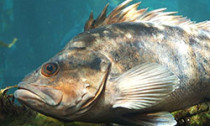
We’ve known for a while that the ocean is rapidly becoming too acidic for some forms of marine life to survive. We know that this is caused by continued rising emissions of carbon dioxide, which dissolves from the atmosphere into the ocean to form carbonic acid, which in turn dissolves/corrodes calcium carbonate-based coral reefs and shellfish.
Now we also know that ocean acidification does more than break down marine skeletons—it can actually cause behavioral changes in individual organisms. Simply stated, ocean acidification is making fish anxious—or, at least, anxiety as we measure it in fish.
Scientists from UCSD’s Scripps Institution of Oceanography and Canada’s MacEwan University recently published this surprising finding in Proceedings of the Royal Society B: Biological Science. But what does it mean for fish to be anxious? According to this study, all it takes is observing how much time the fish choose to spend in dark versus light areas of their habitats. The test subjects were juvenile rockfish, whose natural environments—kelp forests—off the California coast offer varying levels of shade and sunlight. The researchers put a control group of rockfish in a tank with “normal,” or unaltered, seawater and observed the fish moving continuously between the light and dark areas of the tank. They put a second group of rockfish in a tank with seawater of elevated acidity, meant to approximate the expected pH of the ocean one hundred years from now, and observed something different.
Previous studies have shown that fish dosed with anxiety-inducing drugs will, instead of moving continuously around their tanks, prefer to dwell in the dark spots. Turns out, putting fish in slightly more acidic water is just like administering an anxiety-inducing drug. “They would go to the dark part of the tank and they wouldn’t move. They just stayed there,” study co-author Martín Tresguerres told the L.A. Times last week.
“If the behavior that we observed in the lab applies to the wild during ocean acidification conditions, it could mean that juvenile rockfish may spend more time in the shaded areas instead of exploring around,” Tresguerres said in a press release last Wednesday. “This would have negative implications due to reduced time foraging for food, or alterations in dispersal behavior, among others.”
Notice that we’re not even talking about shellfish like lobsters or shrimp, who may or may not be experiencing mental anguish in awareness of their threatened bodily integrity. Let it be said, though, that a future study on anxiety in lobsters is not out of the question. “Behavioral neuroscience in fish is a relatively unexplored field, but we do know that fish are capable of many complicated cognitive tasks of learning and memory,” according to Trevor James Hamilton, another of the study’s co-authors.











Social Profiles